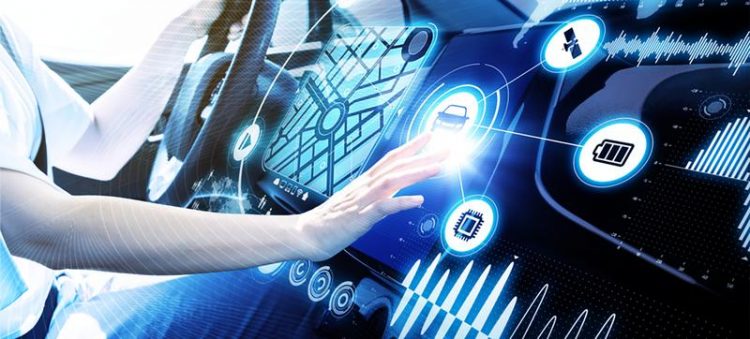Project AUTOASSERT: DFKI scientists develop software tool for the support of German electronics companies

Visualization of a digital-analogue system that is verified early on in the project AUTOASSERT. COSEDA Technologies GmbH
They are the ‘innovation drivers of the digitalization’ in Germany: In order to support the small and medium-sized companies of the electronics industry, the German Federal Ministry for Education and Research (BMBF) is funding projects from which the development of microelectronics in Germany can benefit.
The reason for this is that analogue and digital systems are a key technology for many of todays and future developments in the areas of the Internet of Things (IoT), autonomous driving or medical technology.
One of the projects is AUTOASSERT, in which the DFKI Cyber-Physical Systems research department and the start-up COSEDA Technologies work on ways to allow for a faster and cheaper verification of electronic systems. Since 1 April 2020, scientists led by Prof. Dr. Rolf Drechsler and their project partner develop methods for an assertion-based verification that can verify both digital and analogue systems in an early stage.
Project continues award-winning groundwork
In the assertion-based verification, the software makes statements (assertions) about possible state of the systems before its actual implementation in the hardware, which leads to the detection of errors that do not comply with the expected state. By applying this method, producers can save time and money and are thus more competitive – an advantage that is of great importance especially for small and medium-sized companies.
The challenge in this is to take into account the influences of the analogue-digital hardware during the verification. In the usual procedures, these influences could only be observed after the production of the hardware and the implementation of the software.
A solution for this is the creation and simulation of analogue-digital virtual prototypes including the application software that is of interest. In the project CONVERS, researchers of the DFKI have already successfully worked on this simulation – again in cooperation with COSEDA Technologies.
For their work, the CPS employees Dr. Daniel Grosse and Muhammad Hassan received the Best Paper Award of the ‘Design and Verification Conference Europe’ (DVCon) 2018 in Munich. While CONVERS concentrated on creating simulation scenarios with constraints, which means specifications for the possible content of the variables, AUTOASSERT aims at the automated verification of the simulation results.
For example, the new software can verify the digital-analogue system of an electric car window opener before the car door is built. In the simulation, the method tests whether the window stops moving as soon as a physical resistance is created – e.g. by a hand. The assertion states the stopping of the window as the expected state. Jamming the fingers would thus be recognized as an error.
Early verification saves steps in the production process
The project aim is to integrate the new verification software as a prototype in the COSIDE development environment, which COSEDA Technologies is providing for its clients. The new methods and the heart of the project, an assertion library for heterogeneous systems, offer the opportunity to automatically verify these systems long before the hardware becomes available.
Many technologies are produced and designed in different locations – an early verification, which also takes into account aspects of the physical design via simulation, thus saves many steps in the production process.
The project AUTOASSERT for the development of a prototype software and an assertion library is funded since 1 April 2020 over the course of three years. The German Federal Ministry for Education and Research (BMBF) is providing roughly 830,000 Euros for the project partners, the German Research Center for Artificial Intelligence and COSEDA Technologies.
Photo material
At https://cloud.dfki.de/owncloud/index.php/s/tjQR7coLK3mLxq8 you can find the project logo and a visualization for usage in your publication. Please consider the information on the source of the material when publishing the photo material.
DFKI Contact
Dr.-Ing. Daniel Grosse
German Research Center for Artificial Intelligence (DFKI)
Cyber-Physical Systems
Mail: Daniel.Grosse@dfki.de
Phone: +49 421 218 63935
DFKI Press contact
German Research Center for Artificial Intelligence (DFKI)
Team Corporate Communications Bremen
Mail: uk-hb@dfki.de
Phone: +49 421 17845 4180
Media Contact
More Information:
http://www.dfki.deAll latest news from the category: Information Technology
Here you can find a summary of innovations in the fields of information and data processing and up-to-date developments on IT equipment and hardware.
This area covers topics such as IT services, IT architectures, IT management and telecommunications.
Newest articles

First-of-its-kind study uses remote sensing to monitor plastic debris in rivers and lakes
Remote sensing creates a cost-effective solution to monitoring plastic pollution. A first-of-its-kind study from researchers at the University of Minnesota Twin Cities shows how remote sensing can help monitor and…

Laser-based artificial neuron mimics nerve cell functions at lightning speed
With a processing speed a billion times faster than nature, chip-based laser neuron could help advance AI tasks such as pattern recognition and sequence prediction. Researchers have developed a laser-based…

Optimising the processing of plastic waste
Just one look in the yellow bin reveals a colourful jumble of different types of plastic. However, the purer and more uniform plastic waste is, the easier it is to…



